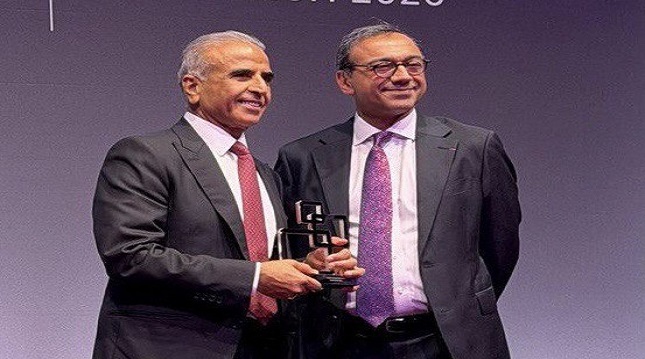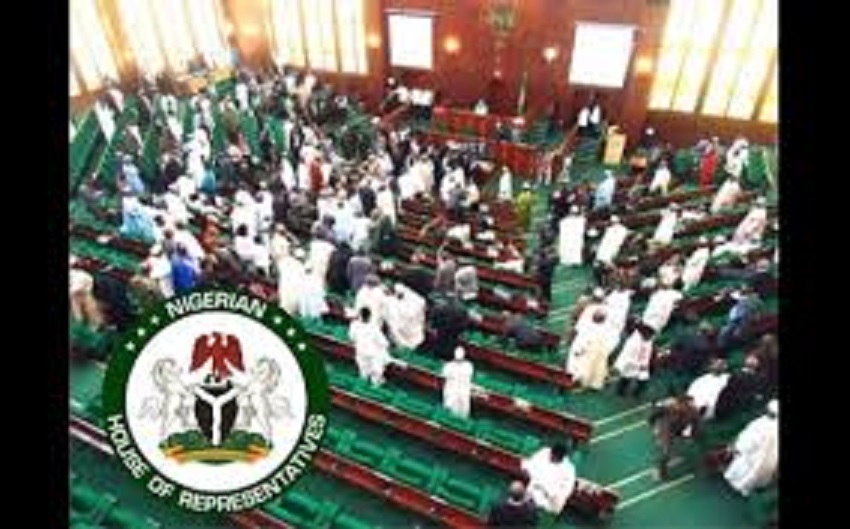Telecom
Nigeria Oils Machine for Launch of Sat2, 2nd Satellite — Pantami

Nigeria is to launch a second satellite (Sat 2) into orbit with a view to boosting the nation’s satellite communications capacity, according to Isa Ali Pantami, minister of Communications and Digital Economy.

Pantami said he has secured the approval of for purchasing the Satellite.
He disclosed this during a one-day working visit and interaction with the staff of the Nigerian Communications Satellite in Lugbe Abuja.
The minister also informed that he had gone further to lobby the Minister of Finance to ensure that this is included in the 2022 Budget.
Though the Minister refused to disclose the amount approved and how many satellites are to be purchased, our findings show that the Federal government earmarked the sum of N2.5 billion for the Satellite 2 project in the 2022 budget estimate.
The existing Sat1R, which was launched in 2011 with a life span of 15 will expire in the next four years.
Recall that the Federal government had in 2017 announced plans to raise $550m required for the construction of two new communications satellites for Nigeria, which the Chinese Export and Import Bank accepted to provide.
According to NIGCOMSAT, the approval of the Chinese bank followed representation by Nigeria that it could not afford the 15 per cent counterpart funding required for the country to access the loan of $550m for the construction of the two new communications satellites.
Also, the minister said he had approved the establishment of some subsidiaries under NIGCOMSAT, as part of the ongoing effort to revive the institution back to the part of progress and productivity.
‘‘Since 2019, I have been so passionate about the success of NIGCOMSAT. Starting with the suspension of the privatization of NIGCOMSAT. As a matter of fact, I have secured the approval of Mr President for purchasing another Satellite. I went further to lobby the Minister of Finance to ensure that this is included in the 2022 budget. I have also approved the establishment of some subsidiaries under NIGCOMSAT as part of efforts to revive the company and make it innovative and productive.’’
Pantami, who told the staff of the company that the innovation in the agency is not enough and needs to be improved upon, charged them to turn the institution around in order to justify the suspension of the proposed privatization plan.
The Minister said, ‘‘Core values should be the guiding principle that must be adopted without compromise, to ensure that any institution is successful. You need to be customer-centric, discover the failure of services before they realize it, fix the problem and come up with innovative ideas. The innovation in the agency is not enough and needs to be improved upon
‘‘You need to change your perception because you are not part of core civil servants, you are a company and should by far be above civil servants. One of the reasons our civil service has been failing is that feeling that we are government employees, we have nothing to lose and whatever happens, we will be paid our salaries.
‘‘There are other companies that are ready to come up and start providing similar services with you. The efforts made to stop privatization of NIGCOMSAT is for the good of the company and for the good of the country.’’
‘‘You need to turn things around through the Unique and effective service you are able to provide and revenue you generate for government. It is a difficult task to revive an institution and make it very successful, that you must make. The challenge of reviving NIGCOMSAT is not just a necessity but an obligation for all the staff,’’ he added.
Speaking on the revolution in NITDA, Pantami said through innovative policies and implementation, he succeeded in raising NITDA revenue from N7 billion to N19 billion annually, an agency that was supposed to be scrapped according to Orosanaya Report.
‘‘We revived NITDA and the agency has become a reference point for any IT project.’’
On NIMC, he said they had also secured the approval of N25 billion for the agency infrastructure upgrade.
‘‘Look at NIMC and what we have achieved, the NIN environment since the inception of National Identity Card to 2020 when I assumed supervision of the commission even after billions have been spent was below 30 million, and this is direct enrollment without leveraging on any database.
‘‘Before I assumed supervision, the annual enrollment used to be around 1.5 to 2million but between October 2020 to December 2021, we increased the NIN environment by 30 million in using the obsolete infrastructure. Mr President has approved N25 billion for the infrastructure but till today, no money has been released from October 2020 to date but we are still doing the work, that is why thinking outside the box is necessary.
‘‘The achievement of this one year has been better than the previous 10 years and within that 10 years there was a time N100 billion was released but this one no single Kobo was released to us. As the DG of NITDA, I increased the revenue generation of NITDA from N7 billion annually to N19 billion. Leverage the opportunity and turn things around.
‘‘Before I became the Minister, there was an Orunsanye report that recommended that NITDA should be scrapped and that the IT clearance should be given to Galaxy Backbone but today nobody is talking about the scrapping of NITDA because the institution has turned things around.
‘‘If you turn things around, you will go back and sleep but if you fail, you will be struggling So the challenge is on your table, the earlier you use 2022 and make NIGCOMSAT better the better for all of you but if you fail to do that, many people are there waiting for me to go so that they can execute their agenda.
‘‘2022 is the best year for you to turn things around but if you fail to do that, it will be the worst year for you I don’t pray for that, I pray for the best for you but you must get your priority right,’’ he said.
Earlier in her welcome address, Dr Abimbola Alale, managing director of NIGCOMSAT, said the coming of the Minister has raised the hope and confidence of the staff and management of the agency through his unprecedented support and increase in yearly budgetary allocation.
She expressed delight for the support being given to the agency by the Minister and assured him that her staff would take up the new challenge and ensure that they deliver on the mandate given by the Minister.
Telecom
Sunil Bharti Mittal Conferred GSMA Lifetime Achievement Award for Transforming Global Telecommunications

The GSMA has conferred a rare Lifetime Achievement Award on Sunil Bharti Mittal, Founder and Chairman of Bharti Enterprises, recognising his role in reshaping the global telecommunications landscape and expanding connectivity across operators, governments, businesses and billions of consumers worldwide.

Bestowed on only a handful of industry leaders in the GSMA’s history, the honour recognises contributions that have left an enduring and defining mark on the global communications ecosystem.
The award was presented at Mobile World Congress in Barcelona in the distinguished presence of His Majesty Felipe VI, the Prime Minister of Spain, Pedro Sanchez, the President of Catalonia, Salvador Illa, and global industry leaders.
A visionary in the telecom sector, Sunil Bharti Mittal has built Bharti Airtel into one of the world’s leading mobile operators, with operations across India and Africa, ranking among the top three globally and serving over half a billion customers.
He pioneered the expansion of mobile services across emerging markets and served as Chairman of the GSMA from 2017 to 2018, where he championed policies that encouraged investment and innovation while strengthening the industry’s commitment to connecting the unconnected and advancing digital inclusion.
He was previously honoured with the GSMA Chairman’s Award in 2008 and again in 2016 for his outstanding contribution to the growth and development of the global mobile industry and was felicitated at Mobile World Congress in February 2019 in recognition of his Chairmanship.
On receiving the award, Sunil Bharti Mittal said, “I am deeply honoured to receive this recognition and sincerely thank the GSMA for this award. I accept it not only as a personal milestone, but as a tribute to India’s telecom journey, the collective spirit of Bharti, and the rise of Indian telecom companies on the global stage.
Equally the award reflects the progress of an industry that has connected billions and belongs to the customers we serve, the teams who built our institutions, and the partners who believe in the transformative power of connectivity.
Telecommunication is a force that expands opportunity, places essential services in the palm of every individual and unlocks human potential. Helping shape its evolution into a powerful accelerator of modern progress has been a privileged responsibility. As innovation accelerates, we will continue to work with our partners & stakeholders to ensure that growth advances equity and creates lasting opportunity for generations to come.”
The Lifetime Achievement Award is a rare honour, bestowed only on select individuals whose leadership and innovation have left an enduring mark on the industry.
Telecom
House Probes Fintech Regulation via Public Hearing on New Commission Bill

House of Representatives is pushing to regulate Nigeria’s fintech sector through a public hearing on “A Bill for an Act to Establish the Nigerian Fintech Regulatory Commission and for Related Matters (HB.2389).”

Speaker Tajudeen Abbas opened the hearing, stressing the need for stakeholder inputs to craft enforceable, constitutional laws addressing regulatory overlaps in digital banking, science, technology, and communications.
Abbas highlighted fintech’s role in Nigeria’s growth via digital payments, blockchain, crowdfunding, and financial inclusion for the unbanked, creating jobs and supporting SMEs under President Tinubu’s Renewed Hope Agenda.
He warned that lagging regulations cause fragmentation, compliance issues, and investor uncertainty, necessitating a coordinating commission for licensing, supervision, standards, and a level playing field without duplicating bodies like the Central Bank of Nigeria (CBN), SEC, NITDA, or NDIC.
The commission would protect consumers, monitor cybersecurity, ensure data privacy, and promote education while complementing existing regulators.
Committee Chairman Emmanuel Ukpong-Udo, overseeing digital banking, banking regulations, science, technology, communications, capital markets, and institutions, called the bill vital for harmonizing oversight amid Nigeria’s rise as Africa’s fintech hub with 430+ firms valued at billions.
Ukpong-Udo emphasized balancing innovation, stability, and coordination to avoid burdens on startups.
Bill sponsor Fuad Kayode Laguda argued the commission would streamline operations currently split among CBN, SEC, NITDA, NOTAP, and FIRS, boosting profitability, user security, and ease of business. He cited 2024-2026 stats: 250-430 firms, $230 billion market projection, $10.6 billion valuation for top nine, and $1.6 billion in mobile transactions.
Fintech stakeholders offered mixed views, with some backing unified regulation and others fearing overlaps with current mandates.
Telecom
Why Digital Trust Matters: Secure, Responsible AI for African SMEs?

By Kehinde Ogundare, Country Head, Zoho Nigeria
For years, security for SMEs across sub-Saharan Africa meant metal grilles and alarm systems. Today, the most significant risks are invisible and growing faster than most businesses realise.

Kehinde Ogundare
Artificial Intelligence has quietly embedded itself into everyday operations. The chatbot responding to customers at midnight, the system forecasting inventory requirements, and the software identifying unusual transactions are no longer experimental technologies. They are becoming standard features of modern business tools.
Last month’s observance of Safer Internet Day on February 10, themed ‘Smart tech, safe choices’, marked a pivotal moment. As AI adoption accelerates, the conversation must shift from whether businesses should use AI to how they deploy it responsibly. For SMEs across Africa, digital trust is no longer a technical consideration. It is a strategic business imperative.
The evolving threat landscape
Cybersecurity threats facing sub-Saharan African SMEs have moved well beyond basic phishing emails. Globally, cybercrime costs are projected to reach $10.5 trillion this year, fuelled by generative AI and increasingly sophisticated social engineering techniques. Ransomware attacks now paralyse entire operations, while others threats quietly extract sensitive customer data over extended periods.
The regional impact is equally significant. More than 70% of South African SMEs report experiencing at least one attempted cyberattack, Nigeria faces an average of 3,759 cyberattacks per week on its businesses, Kenya recorded 2.54 billion cyber threat incidents in the first quarter of 2025 alone, whilst Africa loses approximately 10% of its GDP to cyberattacks annually.
The hidden risk of fragmentation
A common but often overlooked vulnerability lies in digital fragmentation.
In the early stages of growth, SMEs understandably prioritise affordability and agility. Over time, this can result in a patchwork of disconnected applications, each with separate logins, security standards, and privacy policies. What begins as flexibility can involve into operational complexity.
According to IBM Security’s Cost of a Data Breach Report, companies with highly fragmented security environments experienced average breach costs of $4.88 million in 2024.
Fragmented systems create blind spots, each additional data transfer between applications increases exposure. Inconsistent security protocols make governance harder to enforce. Limited visibility reduces the ability to detect anomalies early. In practical terms, complexity increases risk.
Privacy-first AI as a competitive differentiator
As AI capabilities become embedded in business software, SMEs face a choice about how they approach these powerful tools. The risks are not merely theoretical.
Consumers across Africa are becoming more aware of data rights and willing to walk away from businesses that cannot demonstrate trustworthiness. According to KPMG’s Trust in AI report, approximately 70% of adults do not trust companies to use AI responsibly, and 81% expect misuse. Meanwhile, studies also show that 71% of consumers would stop doing business with a company that mishandles information.
Trust, once lost, is difficult to rebuild. In the digital age, a single data leak can destroy a reputation that took ten years to build. When customers share their payment details or purchase history, they extend trust. How you handle that trust, particularly when AI processes their data, determines whether they return or take their business elsewhere.
Privacy-first, responsible AI design means building intelligence into business systems with data protection, transparency and ethical use embedded from the outset. It involves collecting only necessary information, storing it securely, being transparent about how AI makes decisions, and ensuring algorithms work without compromising customer privacy. For SMEs, this might mean choosing inventory software where predictive AI runs on your own data without sending it externally, or customer service platforms that analyse patterns without exposing individual records. When AI is built responsibly into unified platforms, it becomes a competitive advantage: you gain operational efficiency whilst demonstrating that customer data is protected, not exploited.
Unified platforms and operational resilience
The solution lies in rethinking digital infrastructure. Rather than accumulating disparate tools, businesses need unified platforms that integrate core functions whilst maintaining consistent security protocols.
A unified approach means choosing cloud-based platforms where functions share common security standards and data flows seamlessly. For a manufacturing SME, this means inventory management, order processing and financial reporting operate within a single security framework.
When everything operates cohesively, security gaps diminish and the attack surface shrinks. And the benefits extend beyond risk reduction: employees spend less time on administrative friction, customer data stays consistent, and platforms enable secure collaboration without traditional infrastructure costs.
Safer Internet Day reminds us that the digital world requires active stewardship. For SMEs across the African continent who are navigating complex threats whilst harnessing AI’s potential, digital trust is foundational to sustainable growth. Security, privacy and responsible AI are essential characteristics of any technology infrastructure worth building upon. Businesses that embrace unified, privacy-first platforms will be more resilient against cyber threats and better positioned to earn and maintain trust. In a market where trust is currency, that advantage is everything.

 E-Financial1 day ago
E-Financial1 day agoIran-Israel-US Conflict and CBN’s FX Gains: A Stress Test for Nigeria’s Monetary Stability

 E-Financial1 day ago
E-Financial1 day agoMutual Benefits Assurance Reaffirms Full Regulatory Compliance, Enhanced Governance

 General News1 day ago
General News1 day agoJAMB Uncovers AI-Driven Fraud Targeting UTME Candidates, Warns Parents

 General News1 day ago
General News1 day agoSERAP Asks FCCPC to Investigate Google, Meta, Others over Alleged Rights Abuses

 News1 day ago
News1 day agoFlashChange CEO, Bidemi Oke, Urges Startups to Build Strong Governance Structures Early

 News1 day ago
News1 day agoTeamApt, Awabah Partner to Boost Pension Drive for Nigerians

 General News1 day ago
General News1 day agoCapelli Institute Commits to Advancing Trichology in Nigeria

 E-Financial1 day ago
E-Financial1 day agoReps Mull Commission to Regulate Fintech Operations





















